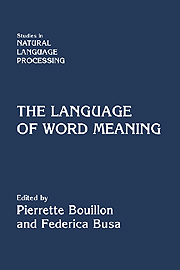Book contents
- Frontmatter
- Contents
- List of Contributors
- Preface
- Introduction: Word Meaning and Creativity
- Part I Linguistic Creativity and the Lexicon
- 1 Introduction
- 2 Chomsky on the Creative Aspect of Language Use and Its Implications for Lexical Semantic Studies
- 3 The Emptiness of the Lexicon: Critical Reflections on J. Pustejovsky's “The Generative Lexicon”
- 4 Generativity and Explanation in Semantics: A Reply to Fodor and Lepore
- 5 The “Fodor”-FODOR Fallacy Bites Back
- Part II The Syntax of Word Meaning
- Part III Interfacing the Lexicon
- Part IV Building Resources
- Index
2 - Chomsky on the Creative Aspect of Language Use and Its Implications for Lexical Semantic Studies
Published online by Cambridge University Press: 07 October 2011
- Frontmatter
- Contents
- List of Contributors
- Preface
- Introduction: Word Meaning and Creativity
- Part I Linguistic Creativity and the Lexicon
- 1 Introduction
- 2 Chomsky on the Creative Aspect of Language Use and Its Implications for Lexical Semantic Studies
- 3 The Emptiness of the Lexicon: Critical Reflections on J. Pustejovsky's “The Generative Lexicon”
- 4 Generativity and Explanation in Semantics: A Reply to Fodor and Lepore
- 5 The “Fodor”-FODOR Fallacy Bites Back
- Part II The Syntax of Word Meaning
- Part III Interfacing the Lexicon
- Part IV Building Resources
- Index
Summary
Abstract
Observations on the creative aspect of language use constrain theories of language in much the way as those on the poverty of stimulus do. The observations as Chomsky discusses them will be explained and their consequences for a semantic theory of the lexicon explored.
Introduction
Chomsky began to mention the creative aspect of language use in the early 1960s; his 1964 Current Issues discusses it. In 1966, Cartesian Linguistics takes it up in detail. At the end of the 1950s he had read extensively in the works of Descartes, Cudworth, Humboldt, and others in the seventeenth to mid-nineteenth centuries “Cartesian linguistics” tradition, and they provided a framework for articulating these ideas. Arguably, though, they were implicit in his review of Skinner and even in The Logical Structure of Linguistic Theory (ca. 1955). The creative aspect observations, along with the poverty of stimulus observations, offer a set of facts with which his and – he holds – any science of language must contend. However, he thinks that the lessons of the creative aspect observations in particular are often ignored, especially in dealing with semantic issues such as truth and reference, meaning and content. He may be right. I review the creativity observations and discuss some of their implications and suggestions for a semantic theory of the lexicon. In their light, I discuss briefly James Pustejovsky's different approach.
- Type
- Chapter
- Information
- The Language of Word Meaning , pp. 5 - 27Publisher: Cambridge University PressPrint publication year: 2001
- 4
- Cited by



